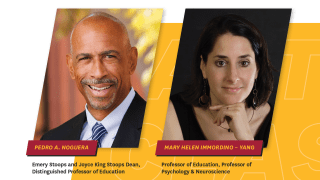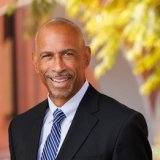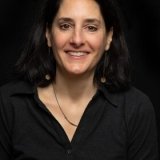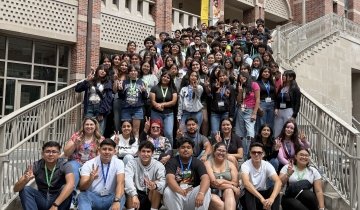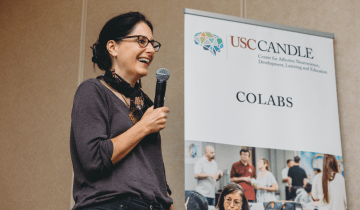This fall, USC Rossier is launching the first in what will be a series of Master Classes, aimed at bringing students, staff, faculty and alumni together in conversation about the critical ideas and issues that cut across education.
For the inaugural class, USC Rossier Dean Pedro A. Noguera and Professor Mary Helen Immordino-Yang will explore “Teaching and Learning to Advance the Needs of Humanity.” The first session will occur on September 19. Community members will be able to attend in person on the University Park campus, with a reception to follow. The lectures will also be available via livestream (RSVP required) and they will be recorded for viewing later.
A second Master Class series will follow in the spring.
Noguera and Immordino-Yang, Director of the USC Center for Affective Neuroscience, Development, Learning and Education (CANDLE), share a belief in the transformative power of education but approach their research from different disciplines. We asked them why they wanted to take on such a big topic and what they hope to learn from each other.
Why did you decide to create this Master Class series?
Dean Noguera: The field of education is characterized by a high degree of fragmentation. Practitioners often don’t engage researchers, policy analysts rarely engage those who hold leadership positions, counselors rarely speak with those from fields like philosophy, linguistics and anthropology who study the underpinnings of our field. At USC Rossier, we want to find new ways to bring people together, across our areas of work, to create opportunities for conversation and possibly collaboration around the big ideas that have the potential to transform how people experience education. If we can do this within our school I believe it can increase our ability to have a huge positive impact on our field and for our society.
We hope that the Master Class will serve as an opportunity to generate some of these cross-area conversations. Our MA students, who are preparing to be counselors, need to hear what researchers who study higher education think about college access. Similarly, our PhD students and faculty who are thinking about how to do research to advance equity in schools, should be engaged with our students who are planning on becoming teachers and who are in real schools and classrooms everyday. I believe we will benefit from having these conversations with each other. Through the Master Class we will create entry points into these kinds of conversations, and provide an opportunity for all of these stakeholders to think together about the larger issues facing our field and society. Hopefully, they will leave thinking, “how can I take some of these ideas back to my work?”
Also, as a school of education, we are working every day to create powerful teaching and learning opportunities. I hope these Master Classes show people what is possible in a classroom.
Why did you choose to start the series with the subject, “Teaching and Learning to Advance The Needs of Humanity”?
Noguera: Education is implicated in so many of the world’s problems: from poverty and inequality to the choices we make now that further climate change and the deterioration of the planet. But education can also be at the heart of the solutions to those same problems if we see education as a resource we can use for creating a better future. In the first Master Class we want to explore how education can be a resource for addressing the major challenges we face, and how teaching and learning might have to change for that to happen.
Immordino-Yang: So many of our models for teaching, from early grades through doctoral programs, date back at least 200 years. Think about how much the world has changed in that time, even in the last 20 or 30 years? Education hasn’t made the same evolution.
We’ve discovered so much about how people grow and develop, and we want to bring these new perspectives into this conversation as we think about which traditional methods remain relevant, and what needs to evolve to meet the needs Pedro is talking about.
Pedro is a sociologist and I’m a neuroscientist and developmental psychologist, so we’re approaching this from different perspectives. Everyone who joins these conversations will bring their own perspectives and experiences. I’m excited to create something new together.
Through this Master Class, you will alternate leading sessions and co-teach the final session. Dean Noguera, you will teach the first session. Why did you want to open this series with such a big question?
Noguera: Well, I felt it wasn’t fair to ask someone else to do something that I felt needed to be done. So, I’m the guinea pig. I’m really glad that Mary Helen was willing to join me in this too. Collectively, we limit ourselves when we think of teaching and learning as something that happens to kids in a school. One of the things I plan to talk about is the Ebola outbreak in West Africa in 2012. The little known story on how that health crisis was averted is that public health officials were able to contain the disease because they were able to go into communities and educate people about the symptoms and the nature of the disease to counter fear and superstition. They also taught people what to do if someone gets sick, and how to safely handle a dead body. That’s teaching that saves lives. It was an example of making science accessible to guide actions. We must learn from these and other examples to confront the challenges we will face in the future.
Hollywood has created dozens of movies about heroic teachers who overcome tremendous obstacles to serve their students. Many of these movies actually perform a disservice to the educators who work in our schools because they imply that if only our teachers worked harder our schools would get better results. They also generally reinforce the dichotomy that prevails in education: teachers teach and students learn. We hope to show that when education is most powerful, teachers and students learn together and apply what they learn in ways that lead to change.
I believe that many of the world’s problems will require educational solutions, at least in part. We need to start thinking about what education looks like when it's focused on generating solutions to the problems we face. Our school should be a leader in modeling this type of educational work.
Professor Immordino-Yang, you’ll be introducing some of the latest research on the science of learning in the sessions you lead. Where do we have the potential for innovation in teaching and learning that can have the type of impact Dean Noguera is talking about?
Understanding the deep connections between learning and emotion is one example. Our emotions, our relationships, and our cultural experiences in the social world literally organize and shape the brain networks that allow us to learn.
When you study a human brain that’s learning, you see a tremendous surge in activity when that learning is tied to emotion. That’s not often the case for rote memorization. When you think about evolution, that makes sense: moments tied to emotion were often tied to survival.
In terms of positive impact, how do we recenter our schools for the modern world in a way that prioritizes how teachers and students experience the thinking process? How do we use this research to bring emotions and cultural experiences into the classroom in a way that helps all students grow their brains?
Noguera: I love learning from Mary Helen because her work forces you to rethink what people have always told you about how people learn. Her work also shows us that such knowledge can be used as a pathway for advancing educational equity.
When equity is our central focus we make sure that everyone feels valued, and that they have the opportunity to participate in rich and challenging learning experiences. This is the kind of education that nurtures creativity, critical thinking and problem solving in people. As my friend, the great Sir Ken Robinson, so famously put it, when we see education as a way to cultivate the inherent talents in people, we reject the idea that only some people have the potential to contribute to the betterment of society. We acknowledge the worth and value of each individual by providing educational experiences that stimulate and support all learners. The sort of recentering Mary Helen is talking about requires us to put people first and strip away a lot of false, deeply ingrained ideas about who can learn and who can achieve.
Immordino-Yang: We need equitable access, but there’s a question on top of that: equitable access to what? "How can we design opportunities for people that lead them to have experiences that grow them in important ways?"
What is it we hope for for our young people and our teachers? How do we support them in developing habits of the mind and experiences in the world that position them to dismantle inequity in the world?
Equity doesn’t just mean we need all the kids to get what some privileged kids get now. It means we need to change what we are doing with all kids, including privileged kids.
Noguera: As we bring more people into these conversations in the USC Rossier community, I think we’re going to create more conversations beyond our school. That’s what we want from these Master Classes: to get people talking, and to turn that talk into action.
Master Class dates
- September 19: RSVP required for the virtual session
- October 10
- October 24
- November 14
- November 28
Registration for each session will open after the previous class has been held.

